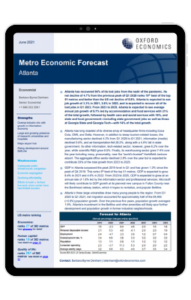US | Metro Economic Forecast: Atlanta

Atlanta has recovered 56% of its lost jobs from the nadir of the pandemic. Its net decline of 4.7% from the previous peak of Q1 2020 ranks 19th best of the top 51 metros and better than the US net decline of 5.6%. Atlanta is expected to see job growth of 3.3% in 2021, 3.6% in 2022, and is expected to recover all of its lost jobs in Q1 2022. From 2023 to 2025, Atlanta is expected to see average annual job growth of 0.7% led by accommodation and food services with 21% of the total growth, followed by health care and social services with 15%, and state and local government—including state government jobs as well as those at Georgia State and Georgia Tech—with 14% of the total growth.
What you will learn:
- Atlanta has long boasted of its diverse array of headquarter firms including Coca Cola, CNN, and Delta. However, in addition to steep tourism-related losses, the manufacturing sector declined 4.2% from Q1 2020 to Q1 2021, information (media) declined 5.6%, and air transportation fell 28.2%, along with a 4.8% fall in state government.
- GDP in Atlanta surpassed the peak 2019 level in Q1 and has grown 1.2% since the peak of Q4 2019. This ranks 9th best of the top 51 metros.
- Atlanta’s three large universities draw many young people to the region. From Q1 2020 to Q1 2021, net migration accounted for approximately half of the 54,400 (+0.9%) population growth.
Tags:
Related Services

Post
Food prices to bottom out in 2024, risks skewed to upside
Our baseline forecast is for world food commodity prices to register an annual decline this year, in aggregate, reducing pressure on food retail prices further downstream. However, we believe the risks to this forecast are overwhelmingly skewed to the upside.
Find Out More
Post
Battery raw material prices to recover
Battery raw materials prices bottomed out last quarter and we think a sustained recovery is looming. Midstream EV battery manufacturing activity has picked up again and inventories have returned to historical levels, suggesting upstream demand for raw materials will also bounce back.
Find Out More